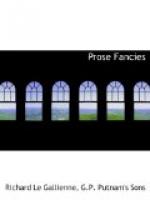And, then, as Alice stepped bewildered homewards, to steal down into her place, and listen, and listen, till the sound of carriages rolled towards the gate, listen till the low hush of the marriage service broke into the wild happy laughter of the organ, and the babbling sound of sweet girls stole through the church porch; then to lie back and to think that Alice and Edward had been married after all—that your little useless life had been so much use, at least: just to dream of that awhile, and then softly fall asleep.
Ah, who would not give all his remaining days to ransom his beloved dead?—to give them the joys they missed, the hopes they clutched at, the dreams they dreamed? O river that runs so sweetly by their feet, when you shall have stopped running will they rise? O sun that shines above their heads, when you have ceased from shining will they come to us again? When the lark shall have done with singing, and the hawthorn bud no more, shall we then, indeed, hear the voices of our beloved, sweeter than song of river or bird?
THE APPARITION OF YOUTH
Sententious people are fond of telling us that we change entirely every seven years, that in that time every single atomy of body (and soul?) finds a substitute. Personally, I am of opinion that we change oftener, that rather we are triennial in our constitution. In fact, it is a change we owe to our spiritual cleanliness. But there is a truth pertaining to the change of which the sententious people are not, I think, aware. When they speak of our sloughing our dead selves, they imagine the husk left behind as a dead length of hollow scale or skin. Would it were so. These sententious people, with all their information, have probably never gone through the process of which they speak. They have never changed from the beginning, but have been consistently their dull selves all through. To those, however, who can look back on many a metamorphosis, the quick-change artists of life, a fearful thing is known. The length of discarded snake lies glistering in the greenwood, motionless, and slowly perishes with the fallen leaves in autumn. But for the dead self is no autumn. By some mysterious law of spiritual propagation, it breaks away from us, a living thing, as the offspring of primitive organisms are, it is said, broken off the tail of their sole and undivided parent. It goes on living as we go on living; often, indeed, if we be poets or artists, it survives us many years; it may be a friend, but it is oftener a foe; and it is always a sad companion.
I sat one evening in my sumptuous library near Rutland Gate. I was deep in my favourite author, my bank-book, when presently an entry—as a matter of fact, a quarterly allowance to a friend (well, a woman friend) of my youth—set me thinking. Just then my man entered. A youth wished to see me. He would not give his name, but sent word that I knew him very well for all that. Being




